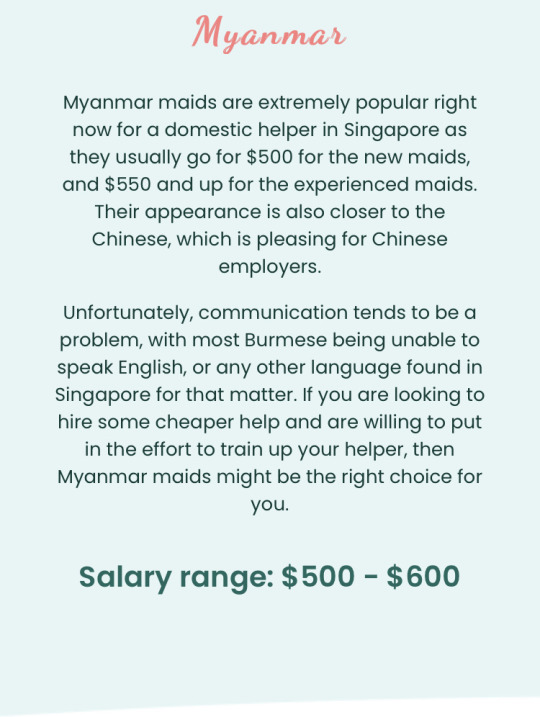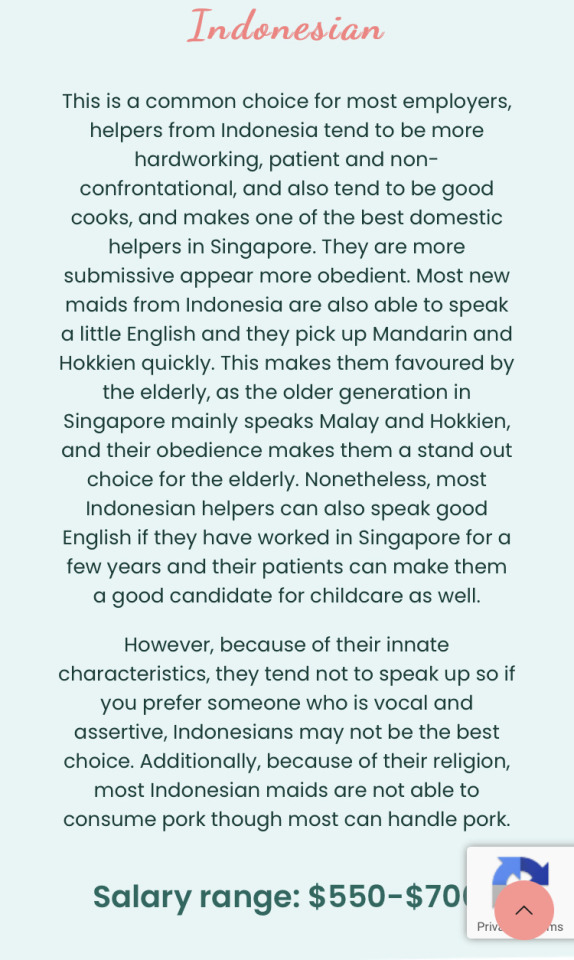#domestic workers
Text
tumblr: your boss is not your friend! they shouldn't be making you do emotional labor! work-life balance! do only what they pay you for and then check out! [to be clear, I agree with this sentiment]
also tumblr: omg why is this literary protagonist saying she's LONELY when there are SERVANTS ALL AROUND HER?! what a SNOB she is to not BEFRIEND THEM AND TELL THEM ALL HER TROUBLES!!!
#tell me you're not seeing it from the workers' perspective without telling me...#history#historical fiction#domestic work#domestic workers
2K notes
·
View notes
Text

from Heresies: A Feminist Publication on Art and Politics - Women Working Together
text: Domestic Workers Association May 19-22, 1938, Chicago. Miss Robinson and a group of workers.
58 notes
·
View notes
Text
Domestic workers throughout the country are pushing for better working conditions, staging rallies and protests and lobbying for labor protections.
The workers, including nannies, house cleaners and home care workers, have launched campaigns in places including Miami, where two organizations led a mid-June march calling for a “Domestic Workers’ Bill of Rights.”
90 notes
·
View notes
Link
Indonesia is the largest democracy in the world without a law to protect its domestic workers. That may be about to change, with a bill that also paves the way to better rights for millions of Indonesians in places such as Hong Kong and Singapore.
But at home, many domestic employees will miss out on the law’s protections completely.
Almost 5 million domestic staff serve as the invisible backbone of South-East Asia’s largest economy, looking after upper-middle-class homes and freeing richer Indonesians to pursue more lucrative careers.
But they are often physically and socially isolated, leaving them particularly vulnerable to exploitation, assault and modern slavery.
The Domestic Workers Protection Bill, which President Joko Widodo aims to pass into law this month, gives household employees - three-quarters of whom are women - more of the rights afforded to formal workers.
Without it, "slavery will be much more entrenched in Indonesian mindsets,” said Lita Anggraini, the country’s leading activist on domestic workers’ rights.
She sees the bill as an important protection against the idea that "anything is acceptable for a domestic worker.”
Siti Khotimah, 24, is an example of just how bad things can get. She was just four months into working for a family in an affluent southern Jakarta neighborhood when her employer chained her, beat her and doused her with boiling water as punishment for a minor theft.
In the months that followed, she was forced to work up to 21 hours a day, her mobile phone was confiscated and her monthly pay of 2 million rupiah ($134) - less than 50% of Jakarta’s minimum wage - was withheld.
"I want to forget everything, but I can’t,” Khotimah said in an interview. The treatment she received during her eight-month stint as a domestic worker left her limping and desperate to return to her home, more than 300 kilometers away.
"I no longer want to work outside” the village, she said. "I’m traumatized.”
Khotimah’s case is an extreme one, and her employers have been charged with domestic violence and deprivation of liberty. But household staff currently have little or no recourse if employers fail to pay the agreed salary or expect round-the-clock service.
For nearly two decades, a bill to protect them has languished in parliament. Local customs that blur the line between employment and honorable service have been a stumbling block. "Ngenger,” for instance, is a Javanese tradition in which wealthy families take care of poorer relatives’ children. In return, the children carry out household chores.
Many policymakers have expressed concern that the bill will criminalize employers who engage in such practices, which advocates say helps poorer children to climb the social ladder through association with their richer relatives.
"In no other country will you find this culture of employing nephews as domestic workers,” said Law and Human Rights Vice Minister Edward Omar Sharif Hiariej. "We have some local cultural practices that differ with other countries, and it’s important to accommodate those.”
Policymakers are usually members of the upper-middle class themselves, Anggraini says, and may have four or five household staff of their own.
"In reality, the majority of lawmakers are employers,” she said. "They see themselves more as employers, rather than representatives of the people. So there is a conflict of interest.”
After months of pressure from workers, activists and the president himself, the latest round of discussions about the bill began in late March. For Jokowi, as the president is known, passing a law before he steps down next year would fulfil a campaign promise he made back in 2014.
Read More: Indonesian Ruling Party’s Presidential Pick Seen as Natural Successor to Jokowi
The bill requires employers and agents to uphold promised wages and working hours, and punishes physical assault with up to eight years’ imprisonment or fines of as much as 125 million rupiah ($8,233), according to a draft reviewed by Bloomberg. It also recognizes domestic helpers’ right to training, health insurance and social security.
For the employees it applies to, the bill meets many of the terms of the International Labour Organization Convention on Domestic Workers. Regulators and workers expect other policies - such as Indonesia’s existing commitments to end child labor and eradicate domestic violence - to fill some of the gaps.
However, the bill falls short of setting a minimum wage and working age, or capping working hours. Issues such as unionization also remain uncovered.
And there’s another, bigger catch. Domestic workers who are hired directly by a household, rather than via an employment agency, are not covered by the bill at all. Direct employees account for roughly 40% of all domestic staff, according to Anggraini.
Lawmakers felt it would be very difficult to enforce stringent labor regulations on direct hires given the informal nature of their employment, said Willy Aditya, who is leading the parliamentary team drafting the bill.
Direct hires must be reported to the local neighborhood head, Aditya said, but their living conditions are dependant on "an approach of mutual help and humanity.”
Many lawmakers, including Indonesia’s first female parliamentary speaker, Puan Maharani, initially resisted the bill citing concerns about customs such as ngenger. Maharani said she wanted to avoid controversy.
Vice Minister Hiariej did not respond to requests for comment about the issue of direct hires.
Still, the bill is a first step to improving protections for domestic workers in Indonesia. And as the country’s middle class expands, the number of household staff is expected to grow too. Around half a million joined the sector between 2008 and 2015, according to the ILO.
New regulations may also become a useful governmental bargaining chip in negotiating better conditions for Indonesians overseas. The nation is one of the world’s biggest sources of domestic staff, with 3.6 million of its citizens employed in wealthier homes around the world, mainly in Southeast Asia, Hong Kong and the Middle East.
"We’re sending a message to the world that Indonesian domestic workers get proper protections,” Vice Minister Hiariej said. "We always ask other countries to protect our domestic workers, and to ask that, we need a law ourselves.” - Bloomberg
41 notes
·
View notes
Text
Revealed: allegations of abuse and captivity without pay at UAE’s lucrative recruitment agencies | Women's rights and gender equality | The Guardian
Abuse within the UAE’s kafala system, which ties low-paid migrant workers’ legal status to their employers, has been well-documented. Domestic workers are particularly vulnerable to abuse within their employers’ home, and those who do leave without their employers’ permission face criminal charges for “absconding”, punishable by fines, arrest, detention and deportation. Less well known are the conditions within the recruitment centres where women are kept, sometimes for months, until an employer is found.
17 notes
·
View notes
Text
A clip from Anthony Bourdain’s Parts Unknown Singapore episode has resurfaced where he challenges the Singaporean hosts for exploiting domestic labour. The Vice article links to https://besthousekeeper.sg/domestic-helpers-in-singapore/ and the way they describe the different ethnic groups is frankly disgusting. See for example, these are from the website:




This is shameful.
#singapore#Anthony Bourdain#Vice#domestic workers#racism#abuse#human rights#racist#maid#maids#Indonesian#filipino#filipinx#Burmese#Mizoram#Southeast Asia
51 notes
·
View notes
Link
14 notes
·
View notes
Text

#nowyouseeus#greatreads#booktok#book recs 2023#bookworm#booklover#singapore#phillipines#domestic work#domestic workers#crazy rich asians#social justice
3 notes
·
View notes
Quote
According to official statistics, India has 4.75 million domestic workers, including three million women. But the International Labour Organisation (ILO) estimates the true numbers to be between 20 and 80 million. That's because in India, housework involves a lot of heavy lifting. Since few homes are equipped with dishwashers, vacuum cleaners or washing machines, nearly all middle class and affluent families hire workers for sweeping, cleaning dishes, laundry, cooking and childcare. The law says children above 14 can also be employed as housework is not considered hazardous.
Geeta Pandey, ‘Why India can't keep its domestic helpers safe’, BBC
#BBC#Geeta Pandey#India#domestic workers#International Labour Organisation#ILO#housework#child workers
2 notes
·
View notes
Text
2 notes
·
View notes
Text
The good, the bad & the ugly
youtube
0 notes
Text
MAF Tadbeer: Your Partner for Seamless Visa Services in Dubai
MAF Tadbeer is your trusted destination for comprehensive visa services in Dubai, with a specialization in House Maid Visa Services. We handle the entire spectrum of visa processing and document clearance for domestic workers, ensuring they possess the essential work permits and legal documentation to legally and comfortably work in the UAE.
A residence visa in Dubai is your gateway to residing in this vibrant city for a specified period, often up to ten years. It is typically issued to individuals sponsored by an employer or a family member already residing in Dubai. At MAF Tadbeer, we simplify the intricate process of obtaining a residence visa in Dubai.
The process begins with securing an entry permit, allowing you to enter Dubai, typically issued by your sponsor and valid for 60 days. Once in Dubai, your sponsor will initiate the application for your residence visa, which involves the submission of various documents, including a passport copy, a medical fitness certificate, and proof of accommodation.
Upon approval of your residence visa, you will need to complete a mandatory medical examination and obtain an Emirates ID card. Additional steps include opening a bank account in Dubai and acquiring health insurance, which your sponsor typically manages.
It's vital to understand that a residence visa in Dubai is tied to your sponsor, be it your employer or family member. In case you change sponsors or lose your job, specific procedures apply to maintain your residency status.
MAF Tadbeer takes the complexity out of Dubai's visa processes, ensuring that domestic workers and their sponsors navigate the system with ease and compliance. With us, you can trust that your visa services in Dubai are handled professionally and efficiently, providing peace of mind and legal clarity for your stay in the UAE.
1 note
·
View note
Text
Domestic Workers’ Organizing in California: An ASATA Update
by ASATA Member Preeti Gamzeh
Over two million homes across California depend on the essential care provided by more than 300,000 domestic workers in the state – yet they remain without health and safety protections in the workplace. Care workers who ensure our economies have a healthy workforce, are ironically and sadly, marginalized and invisible-ized by intentional exclusion from worker protection laws. These exclusions are a remnant of the United States’ legacy of slavery and discrimination against Black and brown immigrant women workers that continue on in California state’s labor code today.
As a result, domestic workers are regularly exposed to health and safety threats. These include exposure to toxic products, heavy lifting leading to muscle tears, sprains, back injuries and other long-term chronic conditions such as asthma, chronic cough, vision impairment, impacts on the reproductive system, and more.
To address this historic inequality, the California Domestic Workers Coalition (CDWC) worked with the National Domestic Workers Alliance (NDWA) to create SB 686, a bill that created the first ever health and safety guidelines for the domestic work industry. This bill was put together by an Advisory Committee of domestic workers, employers, and occupational health and safety experts with Cal/OSHA.
To push for the signing of this bill into law, the CDWC and the NDWA organized a historic rally of over 600 domestic workers in Sacramento,on August 29th. ASATA member Preeti Shekar got to interview Kimberly Alvarenga, the Executive Director of the California Domestic Workers Coalition, to discuss why SB 686 is important and how domestic worker organizing is one of the most important and feminist movement in the country. This discussion aired on KPFA 94.1 FM’s Women’s Magazine on Mon, Oct 9th.
Postscript: After this interview was recorded, Governor Newsom vetoed the bill, on October 2nd, on grounds that homes and businesses cannot be regulated by the same set of laws. The CDWC and the NDWA expressed their disappointment in this decision and are currently re-strategizing. While it is disappointing that this bill was outright vetoed, the organizing of domestic workers, who are largely from black and brown immigrant communities, is one of the brightest sparks of feminist movements in the United States, and is inspiring to organizing care work everywhere.
Learn more about the incredible strides domestic worker organizing in California has made by visiting their website at cadomesticworkers.org and following their updates on social media.
Extra Links/Resources:
youtube





0 notes
Text
Should I Ask My Nanny to Be a Team Player When it Comes to Household Chores?
I've been thinking about this a lot lately.
When it comes to searching for work through nanny agencies, nannies -- especially nannies who are fairly new to the industry -- please make it a point to remember that most agencies are not here for you.
Though they can be a great help in finding higher paying positions at times, they are not a nanny union. They do not exist for the well-being of the nanny. They exist to make money -- and they mostly make money through parents. This means that they will work towards the parents' wants, primarily, so as to keep them as customers.
The result of this truth is often that a lot of representatives for these nanny agencies will work to convince nannies to go against their own best interests for the sake of their clients. An example of this lies in the very advertisements for families looking for nannies on agency websites. The position will be titled "Nanny" but then we'll see something like "The family does have a housekeeper but they are seeking a nanny who has a team-player mentality and a pitch-in attitude." In other words, "we want you to prove to us that you are a 'team player' by behaving like a housekeeper for no extra pay when our actual housekeeper is away." Mind you, nanny-housekeeper hybrids exist. This nanny-housekeeper ought to charge and be paid fully for the added duties. These are two separate jobs, so the pay must reflect that. The pay must ACCURATELY reflect the labor involved. It is a great undertaking to keep a house clean while also taking care of children. If a family does want a nanny-housekeeper hybrid, then all parties involved must sit down and draw up a contract that reflects all duties that the nanny-housekeeper will be expected to fulfill and the appropriate pay, paid regularly and in a timely manner.
Strict boundaries must exist in all relationships, including employer-employee relationships. Parents must be well aware that their nanny is not their housekeeper if they have not agreed to it in a contractual agreement. They should not be asking nannies to complete household chores that do not pertain directly to the children that they have agreed to take care of.
Asking nannies, or any employee who isn't a housekeeper, to complete household chores is a significant overstep of boundaries. It is wrong to ask an employee anywhere to complete tasks for which they will not be appropriately compensated for AND for which they have not agreed to at the time of hire.
While a nanny can feel like family, and it is certainly a wonderful thing to love one's nanny, a nanny is first and foremost a person providing a service in exchange for the agreed-upon compensation. That reality should be the backbone of communications and behaviors in a nanny-parent relationship.
Thank you for reading.
0 notes
Text
2 notes
·
View notes
Text
Crossing Boundaries: Protecting the Rights of Migrant Women Domestic Workers.
DPI-NGO briefing: "Crossing Boundaries: Protecting the Rights of Migrant Women Domestic Workers" (in observance of International Migrants Day 2010)
#DPI-NGO#press briefing#MigrantsDay#18 december#Migrants rights#Domestic workers#International Migrants Day
0 notes